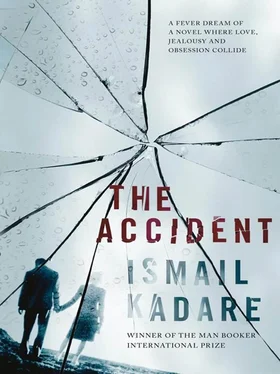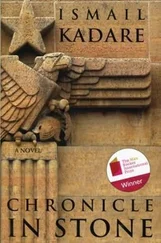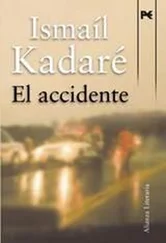The pianist did not get angry, but suddenly drew close to him and said gently that she had wanted to talk about this for a long time, but nobody would listen to her. She had talked about the late-night phone calls, about the Shin Bet, the Israeli secret service, and his terror of the Hague Tribunal. But the investigators did not want to know. Obviously they were scared. Besfort Y. had been a danger to anyone who came near him. Especially to a woman who had slept with him. Apparently he had talked to her about things he should never have mentioned, and had later regretted it.
“Everybody knows what happens when a violent person has second thoughts: the witness disappears. Rovena St. knew the most appalling things. Any one of them would make your hair stand on end. I can tell you, for example, that she knew the precise hour when Yugoslavia would be bombed, two days in advance. You see why I don’t want to talk about these things?”
The inquiry dragged on and grew, sending out new tendrils in all kinds of directions. The researcher made visible efforts to dispel the fog, but equally obvious were his attempts to hide behind it.
Finally, towards the middle of the file, the question arose of why these two protagonists, Besfort Y. and Rovena St., seemed to be trying to cover up their love for each other by pretending to be whore and client.
Delving deeper, the researcher wondered whether Besfort Y. and his friend were merely two people outside the normal order of things.
It was in this part of the file that the researcher for the first time drew attention to his own self, like a man who wanders along an uncertain path and takes care to leave behind certain tokens of recognition, pebbles or dropped ash. After the words “But who am I, trying to enter where no one can go?” there came another phrase: “Look for me and you will find me!”
Apparently certain that another researcher would follow in his footsteps, and another after that, because the lust for know-ledge is as inexhaustible and cyclic as the waves of the ocean of humanity, the author of the inquiry addressed his future counterpart. His words, the more one studied them, resembled the lament of someone who has fallen by his own fault into a trap or a deep dungeon and begs for rescue.
In an appendix to the first part of the inquiry, the researcher returned to what he called the “intrinsic perversity” of the entire story.
It wasn’t merely the speech, the phrases in the conversations and notes that sounded stilted, in other words it was not just that the linguistic style had stiffened, as if under a sudden blow or toxic attack, but that its inner logic appeared disjointed. Rephrasing the content and turning it into normal language still revealed traces of the unnatural, which showed that the flaw lay deeper, and was more essential.
The researcher spent years trying to reach the heart of the matter, like a workman going underground to find damaged cables.
His notes revealed his own agony as much as the suffering of the vanished couple, in a distorting perspective that was at times as intoxicating and liberating as a new vision of the world, and sometimes totally disabling.
What led the two lovers so willingly into such perverseness?
The death of love is like an enveloping chill. But it is never experienced equally by both partners. There is always one on whom the burden of suffering weighs most, at least at first.
However, this was something totally different. The question might be put in another way: were both of them, or only one, to be considered as post mortem ?
It had to be only one of them. One of them had struck a blow at the other. But which?
Again and again the researcher came back to the same question. What had made this couple experience as normal a situation that seemed totally out of this world? What did they know, what did they see that others could not? What hidden laws had they uncovered, what different sequence or flow of time? He was so close. He needed only one step to carry him across into a new dimension of thought. But this single step was impossible.
What was this chain that tethered his mind, like a wild beast, within certain bounds? The suspicion dogged him that these two had been able, if only for an instant, to unleash this animal. They had stepped over the bounds and been lost.
He sometimes thought that what had happened related to the familiar doubt as to whether love really exists, or is merely a sick, over-the-rainbow fantasy, a new phantasm that has appeared on our planet only in the last five or six thousand years. Perhaps we still can’t tell if our planet will accept it, or reject it as foreign tissue.
Whistle-blowers had sounded the alarm about the hole in the ozone layer, about the encroaching deserts, and terrorism, but nobody had yet drawn attention to the fragile state of love. Perhaps a few sects had been created to investigate the truth or falseness of love, and maybe this couple, Besfort Y. and Rovena St., had been members of one of these.
One starry summer night, he felt that he was closer than ever to the forbidden zone, but on its very brink he had collapsed, as if struck by an epileptic fit.
He spent the entire summer in a lethargic depression of the kind that can land you in hospital.
Determined to keep going in spite of every danger, he thought he would try a new approach, using his research data to reconstruct, day by day and month by month, the story of what might have passed on earth between Rovena St. and Besfort Y. during the last forty weeks of their lives. Like Plato, he knew that this story could only be a pale reflection of its eternal form, yet he clung to the hope of finding the essence by starting from the appearance, however misleading this might be.
It would not be an easy task to tell the story of their last forty weeks, and maybe it would turn out to be impossible. The torrent of events surged ahead, and could not be controlled.
Perhaps he could tame it if he divided it into days and months, or acts or cantos, like an ancient epic.
He had heard that The Iliad took four days to tell. Would this be enough for his story too? Like every story, it would have three phases: the first purely imagined, the second clothed in words and the third finally told to others.
He had a presentiment that he would only be able to manage the first.
And so, one night in late summer, he started to imagine their story. But this effort of imagination was so strenuous, and consumed so much passion and empathy, that it drained his entire life-blood away.
Forty weeks before. A hotel. Morning.
As so often in hotels, wakefulness crept up on him from the window. He stared at the curtains for a moment, trying to work out from them which hotel he was in. They told him nothing, not even the city. But he could still recall precisely his dream of a few moments before.
He turned his head. Rovena’s hair, spilt over the pillow, made her face and bare shoulder look even more fragile than usual.
Besfort Y. had always thought that women’s smooth necks and graceful arms were the sort of things that could be used as tactical weapons in war, as decoys by opposing armies.
Fragile, as if he could break her in his arms and master her easily: that is how Rovena had looked twelve years ago, when, for the first time, she had come out of the bath to lie beside him and conquer him. Her breasts were small, like a teenager’s, and strategically important in the battle. After them came her belly, the next snare. Below this, dark, threatening, marked by the dark triangle, lurked the final hurdle. And here he was defeated.
Carefully, so as not to wake her, he lifted the quilt and, as he had done dozens of times before, looked at her belly and the site of his surrender. It was surely the only place in the world where happiness could be found only in defeat.
Читать дальше












